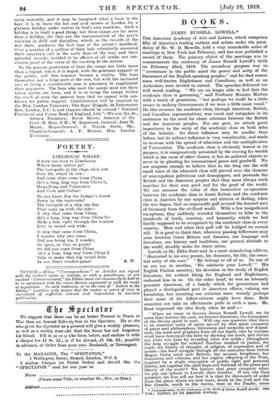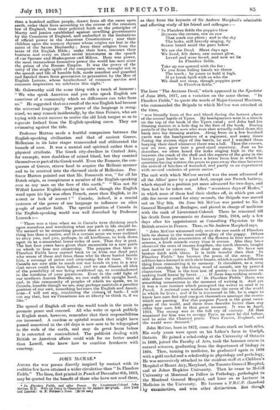BOOKS.
JAMES RUSSELL LOWELL.*
THE American Academy of Arts and Letters, which comprises fifty of America's leading authors and artists under the presi- dency of Mr. W. D. Howells, held a very remarkable series of meetings in New York last February, and has now published a record of them. The primary object of the meetings was to commemorate the centenary of James Russell Lowell's birth on February 22nd, 1819. The secondary purpose was to " accentuate in the public mind the power and unity of the literatures of the English-speaking peoples," and for that reason some well-known Englishmen and Canadians, as well as an Australian, were invited to attend. The speeches delivered are well worth reading. " We are no longer able to feel that the academic class is governing," said Professor Maurice Hutton with a touch of pessimism, " but perhaps we could be a little nearer to making Governments if we were a little more vocal." On this occasion the academic class, through American, British, and Canadian representatives, was vocal and outspoken in its insistence on the need for closer relations between the British and the American peoples. For our part, we attach great importance to the unity of the academic class on both sides of the Atlantic. Its direct influence may be smaller than before, but its indirect influence is very considerable, and tends to increase with the spread of education and the multiplication of Universities. The academic class is obviously honest in its purpose, it is comparatively untainted by the craving for wealth which is the curse of other classes, it has no political objects to serve in its pleading for international peace and goodwill. We are sanguine enough to believe that in the long run the still small voice of the educated class will prevail over the clamour of unscrupulous politicians and demagogues, and persuade the British and the American peoples that they must always work together for their own good and for the good of the world. We can measure the value of this instinctive co-operation between the academic class in Great Britain and the academic class in America by our surprise and distress at finding, when the war began, that an impassable gulf severed the learned men of Germany from the civilized world. With a few insignificant exceptions, they suddenly revealed themselves as false to the standards of truth, courtesy, and humanity which we had fondly supposed to be recognized by the academic class in every country. How and when that gulf will be bridged we cannot tell. It is good to think that, whatever passing differences may arise between Great Britain and America, our language and literature, our history and traditions, our general attitude to the world, steadily make for closer union.
Lowell, as Mr. Elihu Root said in a most stimulating address, " illustrated in his own person, his character, his life, the essen- tial unity of the race." " He belongs to all of us. No one of us can say to another, ' We celebrate your Lowell.' " His English Puritan ancestry, his devotion to the study of English literature, his evident liking for England and Englishmen, endeared him to us. On the other hand, he was an intensely patriotic American, of a family which for generations had played a distinguished part in American affairs, valuing our friendship, but resenting our criticism more warmly perhaps than some of his fellow-citizens might have done. Both countries can take an affectionate pride in such a man. Mr. Root expressed the idea finely when he said :— " When we come to honour James Russell Lowell, we do more than honour the man, we honour literatuve, the interpreter of the Divine spirit in man. Will any one question that there is an essential unity of spirit served by that great company of poets and philosophers, historians and essayists and drama- tists, the seers and prophets from all our lands, who by written word have destroyed the false by showing the truth, and driven out what was base by revealing what was noble ; throughout the long struggle for ordered freedom wedded to justice, for truth, for liberty of thought, of religion, of expression and of action—the hard struggle through all the centuries from before Magna Carta until now Britain, her ancient kingdoms, her dominions and colonies, and her mighty offspring of the West, inspired by a single conception of public right and personal liberty, are together the chief hope and bulwark of the peace and liberty of the world ? We honour that great company when we pay our tribute to Lowell, their brother. If any one does question, let him tell me how it is that for thousands of miles from the place where we now meet, South to the Gulf and the Rio Grande, north to the Arctic, west to the Pacific, more Commemoration of the Centenary of the Birth of Jones &well Lowell, .Now York ; Scribner, for the American Academy,
than a hundred million people, drawn from all the races upon earth, order their lives according to the course of the common law of England, base their political faith on the principles of liberty and justice established against unwilling governments by the Commons of England, and embodied in the limitations of official power in the American Constitutions ; rear their children upon the nursery rhymes whose origins are lost in the mists of the Saxon Heptarchy ; form their religion from the texts of the English Bible ; make their laws, transact their business and carry on their social intercourse in the speech of cur Spenser and Shakespeare and Milton. Here was power, the most tremendous formative power the world has seen since the prime of the Roman Empire. It was the power of the unity of the single spirit of the composite race, wrought out in the speech and life o' humble folk, made manifest and guarded and handed down from generation to generation by the Men of English Letters, whose brotherhood of common service and common inspiration we celebrate this night."
Mr. Galsworthy said the same thing with a touch of humour : " We who speak American and you who speak English are conscious of a community which no differences can take from us." He suggested that as a result of the war English had become the universal language. The power of the language is recog- nized, we may remark incidentally, by the Sinn Feiners, who are trying with scant success to revive the old Irish tongue so as to separate Ireland from the English-speaking races. They are swimming against the tide.
Professor Hutton made a fruitful comparison between the English-speaking civilization and that of ancient Greece. Hellenism in its later stages transcended and obliterated the bounds of race. It was a mental and spiritual rather than a physical attribute. The Greek city-dwellers in Central Asia, for example, were doubtless of mixed blood, but they counted themselves as part of the Greek world. Even the Romans, the con- querors of Greece, strove hard to acquire the Hellenic manner and to be received into the charmed circle of Hellenism. Pro- fessor Hutton pointed out that Mr. Roosevelt was, " for all his Dutch origin, as conspicuous a member of the English-speaking race as any man on the face of this earth." " Was not Sir Wilfrid Laurier English-speaking in mind, though the English word upon his lips was often French, more than English, in its accent or lack of accent ? " Canada, indeed, is a crucial instance of the power of our language to influence an alien people of another faith. The special position of Canada in the English-speaking world was well described by Professor
Leaeock :- " There was a time when we in Canada were thinking much upon ourselves and wondering what our path in life should be. We seemed to be something greater than a colony, and some- thing loss than a nation, and in a certain sense we were inclined to envy you, and you, perhaps, in all kindliness, to look down upon us as a somewhat lower order of men. That day is past. I he last four years have given their memorials to a new pride on which to base our citizenship. The poppies that blow in Flanders Fields have carried back to us from our dead poet who wrote of them and from those who lie there buried beside him, a message of union and citizenship for all time. We in Canada are now able to reach out our hands to you in a way that never could be done before ; and we can dismiss all idea of the possibility of our being swallowed up, or overshadowed in the sunshine of your greatness. Even in the cold light of our northern Aurora Borealis, we can walk with upright head, and, in this community of peoples of which we speak, we in Canada, humble though we are, may perhaps maintain a peculiar position of our own, something between the English and Ameri- cans—I will not sax, combining the virtue of both—I will not say that, but we Canadians are at liberty to think it, if we like."
The spread of English all over the world tends in the main to promote peace and concord. All who write or speak publicly in English must, however, remember that their responsibilities are increased. A careless or spiteful remark that might have passed unnoticed in the cld days is now sure to be telegraphed to the ends of the earth, and may do great harm before it is corrected or contradicted. The publicist dealing with British or American affairs could wish for no better model than Lowell, who knew how to combine frankness with courtesy.



































 Previous page
Previous page